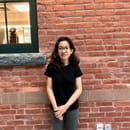Does it count as being productive if you’re searching for ways to be productive? And can thinking of ways to be productive as I binge watch Avatar: The Last Airbender count as productivity?
These were just some of the questions that swirled around my mind as I sat in a Zoom class, listening to the professor discuss upcoming assignments and deadlines. Midterms were quickly approaching, and the workload was beginning to pile up. Just like everyone else, I could barely muster enough energy to stay awake during class.
To say that an entire college semester of remote learning is hard would be a massive understatement. However, being a remote student during senior year must be categorized on an entirely different level of difficulty. No matter how many self-help books and articles I read about the importance of balancing time management and self-care, I found myself constantly struggling to keep up with my assignments while searching and applying for jobs post-graduation.
Regardless of how stressed and isolated I felt, I was still determined to make the most of my second to last semester as an undergraduate student. I decided I was going to create a check list of tasks that I needed to accomplish for that day, which looking back now, was probably my first step towards feeling burnt out.
I had heard that creating to-do lists can serve as a great motivator to accomplish work and stay organized. At the end of each day, I would write down a list of things I wanted to accomplish for the next day, but I always added more tasks than I would be able to realistically finish. At the time, I used this as a way to push myself to work harder, but all it really did was create unnecessary stress.
Even though I typically don’t consider myself to be an overachiever, like most people, I feel a sense of satisfaction whenever I get to check something off of a list. Whenever I finished a task, I would feel a rush of fulfillment (that quickly vanished when I realized how much more work I had to do). It didn’t help that regardless of how hard I worked, there would always be at least two or three things that I wasn’t able to complete by the time the day was over. As a result, I felt annoyed and frustrated with myself over my lack of productivity.
At the time, it would have been smart to stop and analyze why I was feeling the way I was feeling, but I have a bad habit of figuring things out the hard way. Instead of pausing to reflect and feel proud of the work I had finished, I became glued to my laptop as I sped through assignment after assignment. Not only did this destroy any work-life balance I was precariously holding onto, but the quality of my work had decreased as well.
It wasn’t until I was blankly staring at an assignment sheet my professor had just finished explaining a few seconds ago, that I realized I had no clue what the assignment was about. It was at that moment when I realized I was completely burnt out.
While getting burnt out unfortunately isn’t a rare occurrence for students, everyone experiences it differently. For me personally, getting burnt out consisted of me staring blankly at my laptop for hours before crashing for 12 hours (which is the most sleep I’ve gotten since the semester started). Afterwards, I skipped class (not recommended) for two days and binge-watched Peaky Blinders and The Witcher. By the way, I highly recommend watching both of those shows!

Putting aside the mountain of catch-up work I had to complete for the days I missed class, and the miserable realization that there won’t be any new seasons of Peaky Blinders and The Witcher for quite some time, I learned a lot about what it means to be productive when I finally burnt out.
I’ve often heard the phrase “Work smarter not harder” but I didn’t really understand how important it is for everyone, students in particular, until this semester. In the past, I had considered being productive to mean getting the most work done as quickly as possible. But now, I realize that being productive doesn’t exactly correlate with how much work is done, but rather, the quality of the final product. I realized that I didn’t have to do everything at once in order to still be productive. Sometimes being productive just means putting care and attention into what you’re currently working on.
I would be remiss if I didn’t mention the correlation between “hustle culture” and being burnt out. To put it simply, hustle culture means that the more you work, the more successful and admired you will become. It completely negates the importance of maintaining a healthy lifestyle which includes getting a good amount of sleep, eating right, and incorporating time to relax. Unfortunately, most people fall in this hustle culture mindset, and as a result, experience burnout. That’s why it’s so important to realize the difference between being productive and overworking ourselves, in addition to being open to discussing our mental health with one another.
I’ll be the first to admit that I still constantly struggle with maintaining a healthy work-life balance, but I’m trying my best, and I’m going to keep trying until I find something that works best for me. Given the state of the world today, I know it can be easy to think that if you’re not working at 1000% you’re falling behind your peers and won’t be able to find a job or internship. I’m here to tell you that that’s completely false.
As long as you’re working at a pace that benefits both your academic/professional career and your mental health, you’re doing more than enough, and you will succeed. The most important thing is to do what is best for you.



